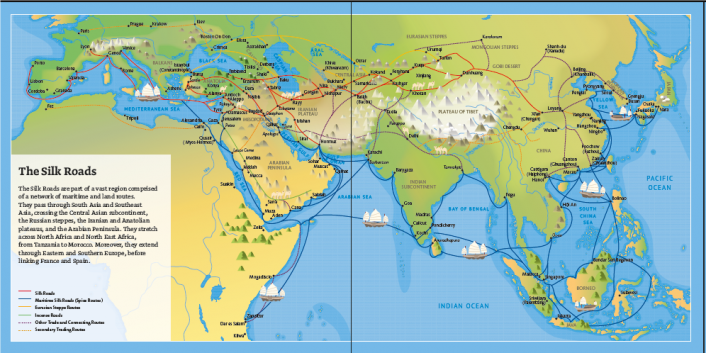Click on the map or on the list to visit the countries
What about the Silk Road?
The so-called Silk Roads were a network of trade routes which connected the East and West, and were central to the economic, cultural, political, and religious interactions between these regions from the 2nd century BC to the 18th century. The name ‘Silk Road’ is actually quite recent: it was appointed by the German geologist Baron Ferdinand von Richthofen in the mid-nineteenth century.
Travelling along the Silk Roads could have taken lots of years and many difficulties and obstacles. Travellers needed where to eat and sleep and that is why caravanserais were built. They became core centers not only to provide an opportunity to eat well, rest, and be safe, but also to exchange goods, trade with local markets and buy local products, and to meet other merchant travellers.
The network of caravanserais stretched from China to the Indian subcontinent, Iran, the Caucasus, Turkey, and as far as North Africa, Russia and Eastern Europe, many of which still stand today.
en.unesco.org
Caravanserais and cities along the Silk Roads also developed into hubs of culture and learning. Merchants and local people had the chance to exchange knowledge, ideas, cultures, beliefs. So, not just silk and many other goods and commodities, but also art, literature, crafts and technologies were shared and taken home. On the other hand, diseases, most notably plague, also spread and slaves were traded along the Silk Roads.
Travelling overland along the Silk Roads still means discovering new cultures, art and crafts, meeting people and sharing ideas, seeing different lands, tasting different food, taking risks. It surely takes time, but it’s really worth it.

Our Journey
We travelled overland along the Silk Roads for five months in 2019. We went from Milan to Beijing and then from Beijing to Moscow via Ulanabaatar, and finally returned to Milan.
We moved by train, bus, marshutka (minibus), shared taxi, and hitchhiking; we took no flights. We have always thought “If local people have always moved overland, we can do the same”. And so we did, sharing all positive and negative aspects, of course.
We have learnt many things during our journey, but this is the most important as it can be applied to many aspects of our frenetic lives:
“The marshutka will pass. You don’t know when, but it will!”


